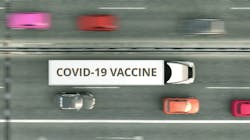With COVID-19 cases and hospitalizations back on the rise, the Federal Motor Carrier Safety Administration extended its pandemic emergency declaration through November, the agency announced on Aug. 31.
First issued in the early days of the COVID-19 pandemic, the emergency declaration has been extended and modified several times since March 2020. The order offers hours-of-service relief for commercial drivers and fleets. This latest declaration expires on Nov. 30—627 days after the initial COVID emergency was announced.
“Although the number of COVID-19 cases began to decline in the U.S. following widespread introduction of vaccinations, the delta variant and lagging vaccination rates reversed that downward trajectory and have resulted in a rapid rise in infections and hospitalizations around the country,” reads the latest FMCSA emergency declaration. “Therefore, a continued exemption is needed to support direct emergency assistance for some supply chains.”
The HOS relief applies to drivers and fleets transporting essential supplies and providing “direct assistance in support of relief efforts related to the COVID-19 public health emergency,” according to the FMCSA. “Direct assistance means transportation and other relief services provided by a motor carrier or its driver(s) incident to the immediate restoration of essential services (such as medical care) or essential supplies related to COVID-19 during the emergency.
The extension and amendment of the emergency declaration for regulatory relief are limited to the following commercial motor vehicle operations providing direct assistance in support of emergency relief efforts related to COVID-19:
- Livestock and livestock feed;
- Medical supplies and equipment related to the testing, diagnosis, and treatment of COVID-19;
- Vaccines, constituent products, and medical supplies and equipment, including ancillary supplies/kits for the administration of vaccines, related to the prevention of COVID-19;
- Supplies and equipment necessary for community safety, sanitation, and prevention of community transmission of COVID-19 such as masks, gloves, hand sanitizer, soap, and disinfectants;
- Food, paper products, and other groceries for emergency restocking of distribution centers or stores;
- Gasoline, diesel, jet fuel, and ethyl alcohol;
- Supplies to assist individuals impacted by the consequences of the COVID-19 pandemic (e.g., building materials for individuals displaced or otherwise affected due to the emergency).
“Direct assistance does not include non-emergency transportation of qualifying commodities or routine commercial deliveries, including mixed loads with a nominal quantity of qualifying emergency relief added to obtain the benefits of this emergency declaration,” according to the filing. “To be eligible for the exemption, the transportation must be both of qualifying commodities and incident to the immediate restoration of those essential supplies.”
The agency also said that fleets could not require fatigued drivers to operate commercial vehicles. The complete emergency declaration can be read here.
About the Author
FleetOwner Staff
Our Editorial Team
Kevin Jones, Editorial Director, Commercial Vehicle Group
Josh Fisher, Editor-in-Chief
Jade Brasher, Senior Editor
Jeremy Wolfe, Editor
Jenna Hume, Digital Editor
Eric Van Egeren, Art Director
